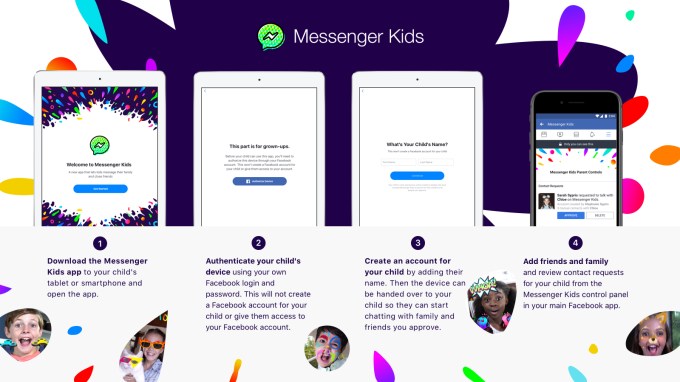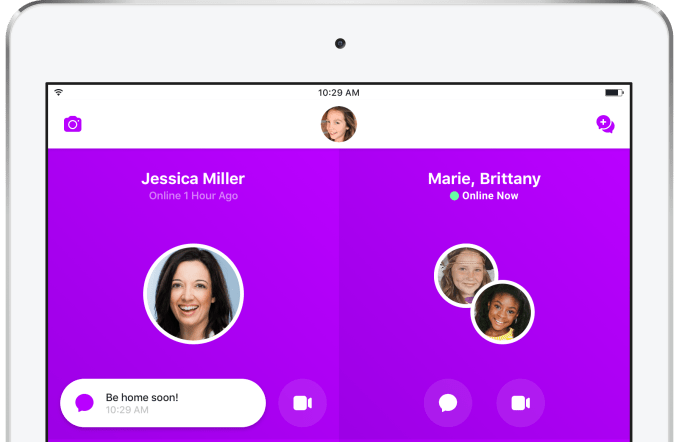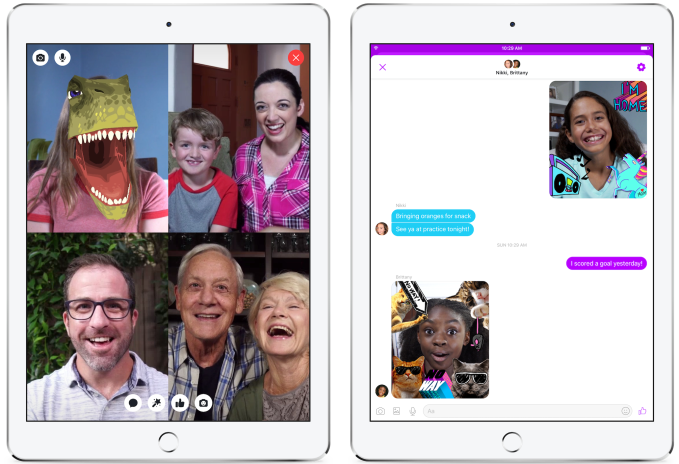For the first time, Facebook is opening up to children under age 13 with a privacy-focused app designed to neutralize child predator threats that plague youth-focused competitors like Snapchat. Rolling out today on iOS in the U.S., “Messenger Kids” lets parents download the app on their child’s phone or tablet, create a profile for them and approve friends and family with whom they can text and video chat from the main Messenger app.
Messenger Kids is being trialled in the US as a standalone app for a smartphone or tablet that is controlled from a parent’s Facebook account and does not create a main Facebook profile for young users.
The social network says the app has been designed to enable children to “safely” video chat and message friends and family, and has been developed in consultation with parents and safety experts.
“Today, parents are increasingly allowing their children to use tablets and smartphones, but often have questions and concerns about how their kids use them and which apps are appropriate,” Facebook’s Loren Cheng said.
“So when we heard about the need for better apps directly from parents during research and conversations with parents, we knew we needed to develop it alongside with the people who were going to use it, as well as experts who could help guide our thinking.
“In addition to our research with thousands of parents, we’ve engaged with over a dozen expert advisers in the areas of child development, online safety, and children’s media and technology who’ve helped inform our approach to building our first app for kids.”
Messenger Kids requires parents to set up an account for their child, where only a name is required, with all contacts added and approved by parents from their main Facebook account.
The app is currently only available in the US on Apple’s iOS operating system.
Facebook says the app complies with US child online privacy laws and contains no adverts.
How Messenger Kids works
It’s important to understand that kids under 13 still can’t sign up for a Facebook account. Instead, parents download the Messenger Kids app to a child’s iPhone or iPad (Android coming soon). Once the parent has authenticated it with their own account, they set up a mini-profile with their kid’s name and photo. Then, using the Messenger Kids bookmark in the main Facebook app, parents can approve anyone who is friends with them as a contact for their kid, like aunts and uncles or godparents. Messenger Kids is interoperable with the main Messenger app, so adults don’t actually have to download the Kids app.
Kids still can’t be found through Facebook search, which protects their privacy. So if a child wants to be able to chat with one of their classmates, their parent must first friend that kid’s parent, and then will see the option to approve that adult’s child as a contact for their own kid. This is by far the most clumsy part of Messenger Kids, and something Facebook might be able to improve with a way for Messenger Kids to let children perhaps photograph a QR code on their playmate’s app to request that their parents connect.
When children open the Messenger Kids app, they’ll see a color-customizable home screen with big tiles representing their existing chat threads and approved contacts, with their last message and the last time they were online. From there, kids can dive instantly into a video chat or text thread with their contacts. No message content is collected for ad targeting (same as Messenger), and there’s no in-app purchases to worry about. Kids can block and unblock their parent-approved contacts.
Facebook hired a special team to develop kid-friendly creative tools, from fidget spinner and dinosaur AR masks to crayon-style stickers. “Video calls become so much more playful with AR,” says Marcus. Sometimes after 5 or 10 minutes it’s really hard to have a sustained conversation with a 7-year-old,” but kids can joke around with Grampa using the selfie filters when they run out of run-on stories to tell them.
Messenger features like location sharing and payments have been stripped out, while the Kids version of Giphy won’t let you search for things like “sex.” Facebook actually manually selected a set of GIFs that kids can use rather than relying on a third-party startup to tag things well enough. Still, a reporting interface written specifically for kids lets them flag anything sketchy to a dedicated support team working 24/7.
One thing that might surprise some people is that there’s no way for parents to secretly spy on what their kids are saying in their chats. Instead, parents have to ask to look at their kids’ screen, which Chung says is a more common behavior pattern. The exception is that if kids report a piece of objectionable content, their parents will be notified but still not shown the content in their own app.
In June, The Information reported Facebook was working on an app for teens called Talk, though that’s a bit different than this pre-teen Messenger Kids app.
While Facebook said in the briefing that the app was designed for kids age 6 to 12, younger kids are allowed on, too. When children turn 13, they won’t instantly have their Messenger Kids profiles turned into real Facebook profiles, nor will they get kicked off Messenger Kids. They’ll still have to build a traditional Facebook account from scratch when they’re ready.




